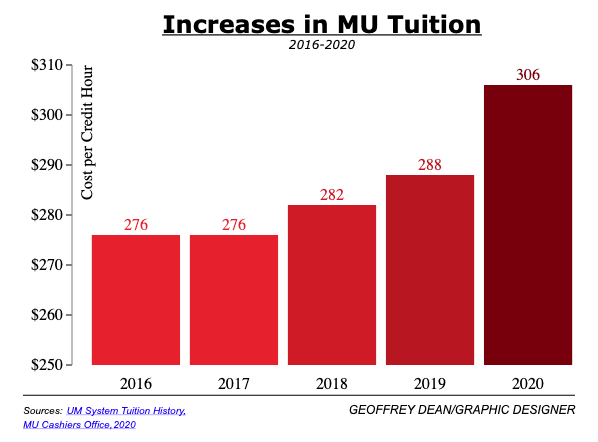
_Hayden Weatherman is a junior secondary education major at MU. He is a guest opinion columnist_
As COVID-19 cases continue to increase on MU’s campus, it’s only a matter of time before classes switch back to strictly online. This didn’t stop the university from raising tuition costs to an outrageous $306 per credit hour for in-state students alone.
Throughout the summer, the university implied that classes would be taught in-person. This impression came from emails MU sent over the summer expressing their desire to have an “in-person” fall. However, about a week before classes were set to start, four out of my five classes moved to an online format.
Many students, such as myself, sign year-long leases to live in Columbia while attending in-person classes. MU failed to communicate the true expectations of this school year before students signed leases that don’t serve the purpose they once did.
None of my classes require me to live in Columbia, but I leased a house in late July. My roommate and I now pay $525 a month for the next year. As in-state students, we’re both able to take our classes from home, but we can’t because we are locked into a lease. If MU had been more transparent about the likelihood of online classes, we would have saved ourselves the cost of a lease.
According to the MU Cashier’s Office, the university refuses to lower tuition for the 2020 school year because students are still getting an education from MU professors and credits are still being counted toward student’s degree programs.
“Regardless of the mode of delivery, classes will be taught by our distinguished Mizzou faculty members, and the opportunity for progress toward [a] degree will be the same,” the office said in an email.. “Tuition and fees are expected to remain the same throughout the semester and will continue to pay for our faculty teaching courses as well as the associated costs of delivering the educational experience in this COVID-related environment.”
This reasoning continues to dumbfound me, as asynchronous classes aren’t really taught but just give the content to the student to teach themselves.
While even Zoom classes allow some sort of connection with the professor or TA, asynchronous classes take the human element away from classes since the lectures are pre-recorded and uploaded over time.
Personally, I find it difficult to learn at home due to distractions. When classes are in-person, it allows me to create a routine around my learning. When that routine is broken, it allows distractions to take away from my learning experience.
According to a survey performed by Barnes and Noble, 64% of students expressed concerns over the ability to focus and motivate themselves while learning remotely.
From 2016 to 2019, MU raised tuition a total of $12 per credit hour. In the 2016 and 2017 school years, tuition cost $276 per credit hour. In 2018, the price was $282 and later increased to $288 in 2019.
function redesign() {
document.getElementById(“articlePictureBox”).remove();
}
redesign();
In 2020, the price of tuition increased to a total of $311 per credit hour for in state students. However, MU received a tuition waiver that reduced the cost for in-state students to $306 per credit hour. That is an increase of 18 dollars a credit hour, or a 6.25% price hike from the previous year. This also does not account for the $14.75 per credit hour students will pay in technology fees, which have also continued to rise from $13.10 per credit hour in 2015.
The increase in tuition is not my concern. The problem is with the timing of raising tuition and fees. It is no secret that many students like myself struggle to grasp concepts while learning online. Zoom meetings and pre-recorded lectures do not lead to better learning and quite honestly will never provide the same value in-person classes have.
Classes are understandably moving to the online format due to rising cases on campus. However, MU failed to give proper communication in a timely manner to students regarding the possibility of online classes. The decision to raise tuition in the middle of a pandemic was unjustified and irresponsible.
MU administrators should reevaluate their decision to increase tuition costs for the 2020-21 school year. If the likes of Georgetown and Princeton can lower tuition costs why can’t MU?
_In pursuit of racial and social equality, The Maneater encourages its readers to donate to Know Your Rights Camp, an organization that works to advance black and brown communities by education and self-empowerment to create the next generation of change leaders. Donate at: https://www.knowyourrightscamp.com/_
_Edited by Sofi Zeman | [email protected]_